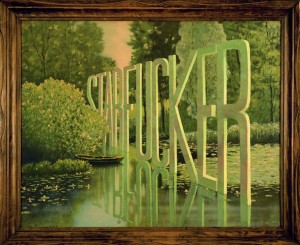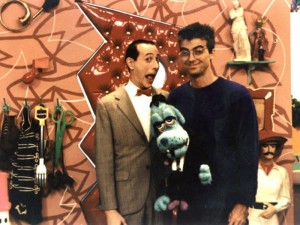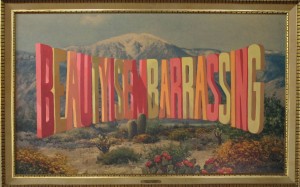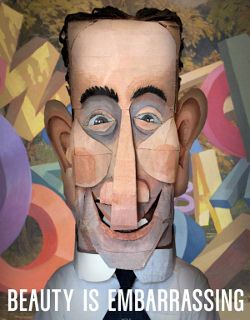A GOOD LIFE
You could do worse than be Wayne White. Wayne White could certainly do worse: he could be anybody else.
A designer and puppeteer on TV shows (most notably Pee-Wee’s Playhouse), a “one-man animation department” on iconic MTV videos, a fair banjo picker, and the guy responsible for those instant kitsch paintings at L.A.’s hipster diner Fred 62, Mr. White surely deserves his wife’s designation as a “hard-working motherfucker.” He’s also extremely engaging on camera. So if you never saw Pee-Wee’s Playhouse but receive a basically positive connotation from the name; if you like pop art as long as it doesn’t represent itself as important; and if you like artists better than ordinary people, you’ll go into Beauty Is Embarrassing with an attitude roughly analogous to this reviewer’s, and you will likely fall in love with the life that this movie presents Mr. White as enjoying.
 Wayne White’s parents love and encourage him. His wife, cartoonist Mimi Pond, wrote the first episode of The Simpsons and several bestselling books of ephemera; the story of their courtship fairly makes one giddy. His kids are pretty and smart and talented. His friends and admirers (including Mark Mothersbaugh, Matt Groening, Paul Reubens, Todd Oldham, and Tony Crow) encompass a cross-section of the coolest middle-aged people in American arts. His career seems to have been marked by the frequent recurrence of merit-based serendipity. One gets the impression from this movie that Mr. White is the luckiest man alive, not least in his choice of biographer. With his first feature, director and writer Neil Berkeley (co-writer with Chris Bradley and Kevin Klauber), has shone a very flattering light on his subject. This approach by Mr. Berkeley’”Mr. White’s former television colleague’”works so well that it hurts the show a little bit.
Wayne White’s parents love and encourage him. His wife, cartoonist Mimi Pond, wrote the first episode of The Simpsons and several bestselling books of ephemera; the story of their courtship fairly makes one giddy. His kids are pretty and smart and talented. His friends and admirers (including Mark Mothersbaugh, Matt Groening, Paul Reubens, Todd Oldham, and Tony Crow) encompass a cross-section of the coolest middle-aged people in American arts. His career seems to have been marked by the frequent recurrence of merit-based serendipity. One gets the impression from this movie that Mr. White is the luckiest man alive, not least in his choice of biographer. With his first feature, director and writer Neil Berkeley (co-writer with Chris Bradley and Kevin Klauber), has shone a very flattering light on his subject. This approach by Mr. Berkeley’”Mr. White’s former television colleague’”works so well that it hurts the show a little bit.
 Hero worship can be sickening to look at, and this movie is far from sickening. It’s a lovely and celebratory little film. But Beauty Is Embarrassing is essentially a portrait of the old school, with no inherent drama but that to be found in its subject. Mr. Berkeley’s movie finds virtually nothing to fault in Mr. White, which, since Mr. White is a human being, means that Mr. Berkeley either didn’t look hard enough or didn’t include in the portrait all that he had found. In fact, a few conflicts are hinted at which clearly received more on-the-record discussion than could dovetail comfortably into this thematically limited piece. So the movie is occasionally repetitive and, at 87 minutes, feels five or ten minutes too long.
Hero worship can be sickening to look at, and this movie is far from sickening. It’s a lovely and celebratory little film. But Beauty Is Embarrassing is essentially a portrait of the old school, with no inherent drama but that to be found in its subject. Mr. Berkeley’s movie finds virtually nothing to fault in Mr. White, which, since Mr. White is a human being, means that Mr. Berkeley either didn’t look hard enough or didn’t include in the portrait all that he had found. In fact, a few conflicts are hinted at which clearly received more on-the-record discussion than could dovetail comfortably into this thematically limited piece. So the movie is occasionally repetitive and, at 87 minutes, feels five or ten minutes too long.
 Watching Mr. White work and talk, which he does simultaneously a few times in the film, one gets the impression of an unusually caffeinated and profane Will Rogers: a blue-collar intellectual poised to slash away the hypocrisies of a stuffed-shirt society, using as a flail only the wit native to his art. It’s good that an approval of Mr. White’s art is not necessary to an approval of the artist. Los Angeles Times art critic David Pagel, in outlining his early dismissal and eventual appreciation of Mr. White’s paintings, describes a fuller arc than many will make in their own appraisals. But, wisely, this movie doesn’t focus on Mr. White’s work, or rather, when it does, it’s only as a backdrop to the real show: Mr. White’s art of living, at which he would appear to excel.
Watching Mr. White work and talk, which he does simultaneously a few times in the film, one gets the impression of an unusually caffeinated and profane Will Rogers: a blue-collar intellectual poised to slash away the hypocrisies of a stuffed-shirt society, using as a flail only the wit native to his art. It’s good that an approval of Mr. White’s art is not necessary to an approval of the artist. Los Angeles Times art critic David Pagel, in outlining his early dismissal and eventual appreciation of Mr. White’s paintings, describes a fuller arc than many will make in their own appraisals. But, wisely, this movie doesn’t focus on Mr. White’s work, or rather, when it does, it’s only as a backdrop to the real show: Mr. White’s art of living, at which he would appear to excel.
 Among the picture’s easy-to-like elements, like its mostly brisk pacing and sometimes surprisingly clever structure of revelations, is included a series of delightful and provocative animated sequences. Some of these are collaborations between the director and Mr. White, or between the director and Ms. Pond; one, a terrifying section delineating an accident that happened when Mr. White was a child, is credited to the collective “Gentleman Scholar.” These propel the slight story and flesh out its narrative elements. They also complement the movie’s nearly fantastical fete of the artistic spirit. If you leave this movie without feeling better than when you went in, you will have to have had a really spectacular day already, or you will have discovered that you are the sort of person who can have his feelings hurt by someone else’s good luck.
Among the picture’s easy-to-like elements, like its mostly brisk pacing and sometimes surprisingly clever structure of revelations, is included a series of delightful and provocative animated sequences. Some of these are collaborations between the director and Mr. White, or between the director and Ms. Pond; one, a terrifying section delineating an accident that happened when Mr. White was a child, is credited to the collective “Gentleman Scholar.” These propel the slight story and flesh out its narrative elements. They also complement the movie’s nearly fantastical fete of the artistic spirit. If you leave this movie without feeling better than when you went in, you will have to have had a really spectacular day already, or you will have discovered that you are the sort of person who can have his feelings hurt by someone else’s good luck.
Beauty Is Embarrassing
Future You Pictures
in limited release September 7, 2012 in New York, Los Angeles and Seattle
then in limited release nationwide
for cities and more information, visit http://www.BeautyIsEmbarrassing.com

